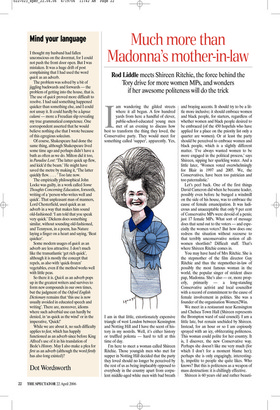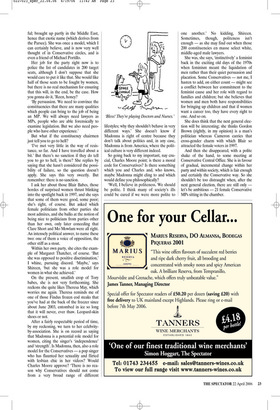Much more than Madonna’s mother-in-law
Rod Liddle meets Shireen Ritchie, the force behind the Tory drive for more women MPs, and wonders if her awesome politeness will do the trick Iam wandering the gilded streets where it all began. A few hundred yards from here a handful of clever, public-school-educated young men met of an evening to discuss how best to transform the thing they loved, the Conservative party. They would meet for something called ‘supper’, apparently. Yes, I am in that little, extortionately expensive triangle of west London between Kensington and Notting Hill and I have the scent of history in my nostrils. Well, it’s either history or truffled polenta — hard to tell at this time of day.
I’m here to meet a woman called Shireen Ritchie. Those youngish men who met for supper in Notting Hill decided that the party they loved should no longer be perceived by the rest of us as being implacably opposed to everybody in the country apart from corpulent middle-aged white men with bad breath and braying accents. It should try to be a little more inclusive; it should embrace women and black people, for starters, regardless of whether women and black people desired to be embraced (of the 450 hopefuls who have applied for a place on the priority list only a quarter are women). Or at least the party should be perceived to embrace women and black people, which is a slightly different matter. ‘I’ve always wanted women to be more engaged in the political process,’ says Shireen, sipping her sparkling water. And a little later, ‘Women voted overwhelmingly for Blair in 1997 and 2005. We, the Conservatives, have been too patrician and too paternalistic.’ Let’s peel back. One of the first things David Cameron did when he became leader, possibly even before he bunged a windmill on the side of his house, was to embrace the cause of female emancipation. It was ludicrous and unacceptable that only 9 per cent of Conservative MPs were devoid of a penis; just 17 female MPs. What sort of message does that send out to the voters — and especially the women voters? But how does one redress the situation without recourse to that terribly unconservative notion of allwomen shortlists? Difficult stuff. That’s where Shireen Ritchie comes in.
You may have hard of Mrs Ritchie. She is the stepmother of the film director Guy Ritchie and thus the stepmother-in-law of possibly the most famous woman in the world, the popular singer of strident disco pap, Madonna. She’s also — or, more properly, primarily — a long-standing Conservative activist and local councillor with a record of commitment to the cause of female involvement in politics. She was a founder of the organisation Women2Win.
We meet in a restaurant near Kensington and Chelsea Town Hall (Shireen represents the Brompton ward of said council). I am a little late, but remain unchided by Shireen. Instead, for an hour or so I am copiously sprayed with an icy, obliterating politeness. This woman could polite for her country. It is, I discover, the new Conservative way. Perhaps she doesn’t like me very much (for which I don’t for a moment blame her); perhaps she is only engagingly, interestingly, impolite to people she quite likes. Who knows? But this is politeness as a weapon of mass destruction: it is chillingly effective.
Shireen is 60 years old and rather beauti ful; brought up partly in the Middle East, hence that exotic name (which derives from the Parsee). She was once a model, which I can certainly believe, and is now very well thought of in Conservative circles, and is even a friend of Michael Portillo.
Her job for the party right now is to police the list of candidates in 200 target seats, although I don’t suppose that she would care to put it like that. She would like half of those seats to be fought by women, but there is no real mechanism for ensuring that this will, in the end, be the case. How you gonna do it, ’Reen, honey?
‘By persuasion. We need to convince the constituencies that there are many qualities which people can bring to the job of being an MP. We will always need lawyers as MPs, people who are able forensically to examine legislation. But we also need people who have other experience.’ But what if the constituency chairmen just tell you to go to hell?
‘I’ve met very little in the way of resistance, so far. And I have travelled about a bit.’ But there’s no sanction if they do tell you to go to hell, is there? She replies by saying that she hasn’t considered the possibility of failure, so the question doesn’t apply. She says this very sweetly. But remember: there is no sanction.
I ask her about those Blair Babes, those hordes of surprised women thrust blinking into the spotlight back in 1997, and she says that some of them were good, some poor; she’s right, of course. But asked which female politicians from other parties she most admires, and she balks at the notion of being nice to politicians from parties other than her own, only later conceding that Clare Short and Mo Mowlam were all right. An intensely political answer, to name these two: one of them a voice of opposition, the other stiff as a stoat.
Within her own party, she cites the example of Margaret Thatcher, of course. ‘But she was opposed to positive discrimination,’ I whine, pursuing discord. ‘Maybe,’ says Shireen, ‘but she was a role model for women in what she achieved.’ On the present, smallish crop of Tory babes, she is not very forthcoming. She reckons she quite likes Theresa May, which worries me again. Theresa reminds me of one of those Findus frozen cod steaks that you’ve had at the back of the freezer since about June 2003, entombed in ice so long that it will never, ever thaw. Leopard-skin shoes or not.
After a fairly respectable period of time, by my reckoning, we turn to her celebrityby-association. She is on record as saying that Madonna is a potential role model for women, citing the singer’s ‘independence’ and ‘strength’. Is Madonna, then, also a role model for the Conservatives — a pop singer who has flaunted her sexuality and flirted with lesbian chic in her videos? Would Charles Moore approve? ‘There is no reason why Conservatives should not come from a very broad range of different lifestyles; why they shouldn’t behave in very different ways.’ She doesn’t know if Madonna is right of centre because they don’t talk about politics and, in any case, Madonna is from America, where the political culture is very different indeed.
So going back to my important, nay crucial, Charles Moore point; is there a moral code for Conservatives? Is there something which you and Charles and, who knows, maybe Madonna might cling to and which would define you philosophically?
‘Well, I believe in politeness. We should be polite. I think many of society’s ills could be cured if we were more polite to one another.’ No kidding, Shireen. Sometimes, though, politeness isn’t enough — as she may find out when those 200 constituencies en masse select white, middle-aged male lawyers.
She was, she says, ‘instinctively’ a feminist back in the exciting old days of the 1970s when feminism meant the liquidation of men rather than their quiet persuasion and placation. Some Conservatives — not me, I hasten to add, on either count — might see a conflict between her commitment to the feminist cause and her role with regard to families and children; but she believes that women and men both have responsibilities for bringing up children and that if women want a career too, they have every right to one. And so on.
She does think that the next general election will be interesting; she thinks Gordon Brown (rightly, in my opinion) is a man’s politician whereas Cameron carries that cross-gender charm with which Blair so attracted the female voters in 1997.
And then she disappeared, with a polite shake of the hand, to some meeting at Conservative Central Office. She is in favour of gradual, incremental change within her party and within society, which is fair enough and certainly the Conservative way. So she shouldn’t be too distraught when, after the next general election, there are still only — let’s be ambitious — 21 female Conservative MPs sitting in the chamber.



































































 Previous page
Previous page